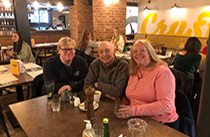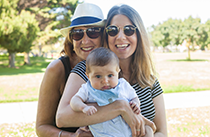“It’s always a shock when someone dies, whether it is expected, or unexpected,” says Linda Magistris from The Good Grief Trust, a national umbrella charity, which signposts people to bereavement support services.
“But there are many options for what happens before and after someone dies, which can help you process the pain of loss and keep you connected to the person who’s gone.”
Things to think about
If you know a loved one is dying, try to talk about how you wish to spend the time you’ve got left together. You may worry about how best to approach this conversation. The Good Grief Trust has information about things to consider before and after someone dies, which may help both of you start to talk about the things that matter to you.
“Knowing what options are available can be empowering,” says Ms Magistris, who founded The Good Grief Trust after her partner Graham died.
We don’t move on from people we’ve lost. We move forward with them
For example, if a person dies at home, they can stay at home until the funeral, and if they die in hospital, you can bring them home before the funeral. You may choose to make keepsakes using their fingerprints or samples of their handwriting. Some people have jewellery or artwork made using the imprints or ashes of their late loved ones, and they come to treasure these items.
“We all deal with death differently, and our grief is as unique as we are,” says Ms Magistris. “Knowing your options can help you ask for what you need.”
Get support with your health and wellbeing
Sign up to our fortnightly Heart Matters newsletter to receive tips on coping with difficult emotions, looking after your health and living well. Joining is free and takes two minutes.
I’d like to sign-up
Ways to remember a loved one
If you have the time before someone dies, you may want to create new memories. Taking photos or making videos and voice memos can help you celebrate the life of the person you love.
“You can remember the person you’ve lost by speaking their name, by setting an extra plate at the table, by taking a walk along their favourite route down the pier, or having fish and chips at their favourite shop,” says Ms Magistris. We can share stories and remember what they liked and disliked, saying, ‘Mum would have loved that’, or ‘Dad would have preferred this to that’.”
Express your feelings
You may feel guilty after a loved one dies, if you missed the chance to say goodbye, or you may feel like you’ve said the wrong thing or left on bad terms. With terminal or life-limiting illness, you may question the diagnosis and wonder if you could have done something earlier.
At the same time, you may be feeling drained, exhausted, and stressed by the loss, and overwhelmed by the practical decisions you must make. These decisions, too, can make you doubt if you’re doing the right thing, especially if the person who’s died hadn’t left a clear set of wishes.
"These feelings are natural,” says Ms Magistris. “Grief that is not acknowledged and supported early on, can affect our mental and physical health. Find out what support is available and benefit from it.”
Where to turn for support
Grieving a day at a time
Every person’s grief is unique to them and there are no rules for grieving ‘well’. One day you may need counselling, the next day you may need peer support, and the day after you may need a yoga session. Then six months down the line you may need counselling again.
One person’s story can be another person’s hope
Meeting other people who are grieving can be powerful. “One person’s story can be another person’s hope,” says Ms Magistris. Seeing someone who is ‘managing’ their grief over time can help you to know there is a way forward.
Aaron’s story

"My dad had a cardiac arrest when he was 60 and I was 16. One minute, he was sitting next to me on the sofa and the next minute his heart had stopped beating. I gave him CPR, and he had an ICD fitted. It later caused problems with one of the valves in his heart, and he started going into heart failure.
When Covid hit, we noticed he needed to go to hospital. I’m in medical school and I understood the progressive decline that heart failure usually follows. Once I'd admitted that to myself, two years before he passed, I started grieving.
He must have known as well, but we only ever had one conversation about his death. He said, ‘Aaron, I'm not going to be around for ever.’ And I said, ‘I know.’
We had a bit of a chat and I think it put both of us at ease. I wish we’d talked more about it because we didn’t know what kind of funeral he wanted or where he wanted to be buried. But it wasn’t his way to talk about those things.
We never got to do a lot of the typical things that dads do with their sons. But I cherish the time we did get together in between his cardiac arrest and his death. He taught me to drive, which I’ll always remember, though his approach was stressful at times.
When he deteriorated, it was a tough decision to put him on palliative care. I felt guilty about it. But I also knew it was the right call. It helped him die in peace, with dignity.
After he’d died, he was cremated and we plan on scattering his ashes at the four places that mean a lot to us, including a remote place in Scotland where we were often went on holiday. I’m sure when we go, I’ll feel like he’s still with me, in a way. I hear his voice in everything I do, which can be a comfort at times.
To other people in this situation, I'd say try and slowly learn to accept it, and help your loved one live their days to the full. It's going to be hard, but you’ll treasure the memories you make."
Danielle’s story

"Mum passed away in October 2021. She was in Tenerife on holiday with Dad. It was peak Covid time, and I was isolating at her house with my two sons, having just come back from Vietnam where I had been living.
I had not seen my family for 20 months due to Covid. I saw Mum for one day after coming back. She wanted to cancel the holiday, but I told her to go, that we’d see each other when she came back.
The night before I got the news, I had a WhatsApp conversation with her about what presents she’d bring back for my two sons who were four and two at the time. The next morning, my boys were watching films on my phone. I’d missed several calls that they kept swiping up to ignore, and eventually my sister called the landline.
She said Mum had had a fall. And that she’d died. I didn’t want to believe it. How could it be true? When I eventually let go of the phone, I stood in the shower, and I thought, I don’t have a mum.
From an autopsy we learned that she had excess fluid in her lungs, which could be either from a heart attack or a blood clot. We don’t know which one it was. With Brexit and Covid, it took a long time to bring her home. We’re Jewish and the Traditional Jewish law requires that a person be buried within 24 hours, but it took 12 days, which is a long time.
As soon as Dad returned from Tenerife with my Mum’s items, I put on her wedding band, and I’ve been wearing it ever since.
We sat a three-day Shivah, which is a mourning period in Judaism that normally lasts seven days. Family and friends supported us, brought us food, and shared their stories of Mum. It was the day after the Shivah that was the hardest. The day when people stopped coming, when we had to return the chairs, and life just went on.
My son started at a new school in England the next day. He had a picture taken at the same spot in our family garden where my siblings and I had our school pictures taken. My heart ached because Mum wasn’t there for it.
I was 35 when she died. My life changed in an instant. When I used to see an empty seat on a plane, I thought, oh someone cancelled. Now I see an empty seat and I think, Mum had left an empty seat. I signed up for extra medical tests because every heart flutter, every leg pain, was making me anxious.
I’m getting better at looking after myself. And I'm trying to let go of the idea of ‘busy’, which is so artificial. We're all ‘busy’, but what matters at the end of the day is quality time with a loved one. I try to live by it, and to anyone out there, I'd say, have lunch with the person that matters while you still can."
What to read next...
